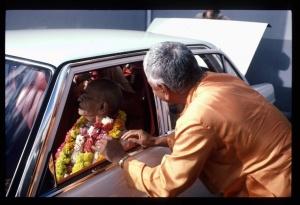SB 2.7.12

A.C. Bhaktivedanta Swami Prabhupada
TEXT 12
matsyo yugānta-samaye manunopalabdhaḥ
kṣoṇīmayo nikhila-jīva-nikāya-ketaḥ
visraṁsitān uru-bhaye salile mukhān me
ādāya tatra vijahāra ha veda-mārgān
SYNONYMS
matsyaḥ—incarnation of the fish; yuga-anta—at the end of the millennium; samaye—at the time of; manunā—the would-be Vaivasvata Manu; upalabdhaḥ—seen; kṣoṇīmayaḥ—up to the earthly planets; nikhila—all; jīva—living entities; nikāya-ketaḥ—shelter for; visraṁsitān—emanating from; uru—great; bhaye—out of fear; salile—in the water; mukhāt—from the mouth; me—mine; ādāya—having taken to; tatra—there; vijahāra—enjoyed; ha—certainly; veda-mārgān—all the Vedas.
TRANSLATION
At the end of the millennium, the would-be Vaivasvata Manu, of the name Satyavrata, would see that the Lord in the fish incarnation is the shelter of all kinds of living entities, up to those in the earthly planets. Because of my fear of the vast water at the end of the millennium, the Vedas come out of my [Brahmā's] mouth, and the Lord enjoys those vast waters and protects the Vedas.
PURPORT
During one day of Brahmā there are fourteen Manus, and at the end of each Manu there is devastation up to the earthly planets, and the vast water is fearful even to Brahmā. So in the beginning of the would-be Vaivasvata Manu, such devastation would be seen by him. There would be many other incidents also, such as the killing of the famous Śaṅkhāsura. This foretelling is by the past experience of Brahmājī, who knew that in that fearful devastating scene, the Vedas would come out of his mouth, but the Lord in His fish incarnation not only would save all living entities, namely the demigods, animals, men and great sages, but would also save the Vedas.